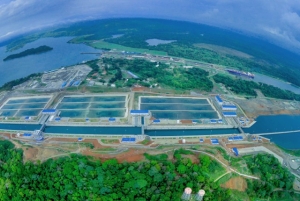


(Posted on 03/12/23)
The Dry Bulk and LNG segments have borne the brunt of restricted transits, particularly due to their ad hoc scheduling. In contrast, liner shipping has faced minimal consequences from transit reductions but has been significantly affected by draught reductions.
Container xChange, the leading online platform for container logistics, provided this crucial insight into the far-reaching effects of the ongoing Panama Canal crisis on global trade and on the shipping industry.
“The Dry Bulk and LNG segments have experienced the greatest impact due to restricted transits, primarily because they don't adhere to a fixed liner schedule but instead "arrive at the canal on an ad hoc basis." In contrast, liner shipping has faced minimal consequences from transit reductions but has primarily been affected by draught reductions. The maximum draught has been decreased from 50 feet to 44 feet, with each foot reduction in draught resulting in a "loss" of 400 TEU capacity. Consequently, an average container vessel can now transport 2400 TEU less.” shared Christian Roeloffs, cofounder and CEO of Container xChange.
The Panama Canal, currently spared from chaos, finds an unexpected ally in the form of a demand lull, preventing disruptions that would have posed a significant challenge for westbound trade shippers.
“At present, container shipping trade flows remain unencumbered. However, anticipating increased pressure on the US east coast, the Suez Canal and the Cape Horn in the coming months, shippers are likely to explore alternative routes to circumvent potential disruptions.” added Roeloffs.
The immediate impact includes a halved number of vessels passing through the canal, resulting in shipping companies rerouting vessels, blank sailings, longer transit times, and potential higher shipping costs in the coming times.
The mid to long term repurcussions of Panama Canal situation will run easily throughout the next year (2024) because of the irreversible environmental concerns that will dwindle the performance of the canal in time.
The ongoing challenges, compounded by the Panama Canal Authority's water conservation measures in response to a drought, have led to prolonged wait times, capacity limitations, and additional strain on shipping schedules. Measures like the restriction of booking slots and adjustments to vessel weight requirements have further elongated waiting times.
The resulting supply chain disruptions are expected to reverberate throughout the industry, potentially impacting container prices. Heightened competition for available slots has driven up spot freight rates, prompting carriers to re-evaluate pricing strategies to offset increased costs and uncertainties. Several carriers have already announced new fees for Panama transits including MSC who will impose a US$297/container Panama Canal Surcharges (PCS) from 15 December.
According to the Panama Canal Authority, the average daily queue of non-booked vessels waiting for transit has increased from 2.5 days on November 4, 2023, to 9.3 days as of November 28, 2023, for northbound vessels. Southbound vessels have experienced a similar trend, reaching an average waiting time of 10.5 days.
As a response to the crisis, carriers are redirecting more volume to the U.S. West Coast or opting for routes via the Suez Canal. This shift in shipping patterns may impact transportation costs, delivery times, and overall supply chain efficiency for U.S. businesses. The potential escalation of intermodal volume to the U.S. West Coast could affect capacity and efficiency, leading to increased costs or delays for businesses relying on these services.
Torvald Klaveness has announced the decision to consolidate all digital services under Klaveness Digital... Read more
The International Association of Dry Cargo Shipowners (INTERCARGO) has renewed its call for straightforward... Read more
The Swedish Club has delivered strong results for 2024, posting a USD 34 million profit and significantly... Read more
In line with NORDEN’s positive long-term outlook for Capesize freight rates, the company have... Read more
OrbitMI, a global provider of maritime software and data products, has expanded its workflow capabilities... Read more
Current ClassNK Senior Vice President Hayato Suga has been appointed as President & CEO as well... Read more
The surge in demand for Cape Size bulk carriers will continue for another six weeks, driven on by increased... Read more
OrbitMI, a leading provider of maritime SaaS software, has announced that Istanbul-based Statu Shipping... Read more
“The International Association of Dry Cargo Shipowners (INTERCARGO) is deeply saddened by the... Read more
As the shipping industry continues its transition to carbon-neutral fuels, ammonia and hydrogen are... Read more